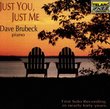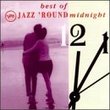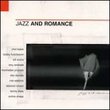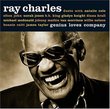| All Artists: Duke Ellington Title: Such Sweet Thunder Members Wishing: 1 Total Copies: 0 Label: Essential Jazz Class Release Date: 8/20/2008 Album Type: Import Genres: Jazz, Pop Style: Swing Jazz Number of Discs: 1 SwapaCD Credits: 1 UPC: 8436028694167 |
Search - Duke Ellington :: Such Sweet Thunder
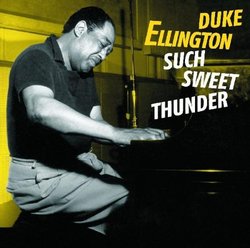 | Duke Ellington Such Sweet Thunder Genres: Jazz, Pop
2008 reissue of the complete original album Such Sweet Thunder, Duke Ellington and Billy Strayhorn's musical vision of the works of William Shakespeare featuring three extra tracks from the same sessions that were not incl... more » |
Larger Image |
CD DetailsSynopsis
Album Description 2008 reissue of the complete original album Such Sweet Thunder, Duke Ellington and Billy Strayhorn's musical vision of the works of William Shakespeare featuring three extra tracks from the same sessions that were not included on the original LP, as well as two other complete Ellington suites: The Harlem Suite and The Controversial Suite. For an African American Jazz musician to compose a suite based on Shakespearian themes during the 1950s was certainly not an every day occasion. In fact, it would have been an ambitious project even for a classical composer. But when the composer in question is the one-and-only Duke Ellington, no one is surprised at all. 18 tracks. Essential Jazz Classics. Similarly Requested CDs
|
CD ReviewsAnother huge disappointment Samuel Chell | Kenosha,, WI United States | 09/18/2008 (5 out of 5 stars) "[The pictured Spanish edition finally arrived. Despite the advertising, it's not the Columbia LP version with CT/Puck's famous quotation at the end. The pressing otherwise is first-rate, with fuller-sounding piano in the mix than the Sony/Columbia reissue. Still, it's enough to make you want to strangle someone. Duke's discography is served so poorly in the first place, but here the crime is compounded because of all the self-congratulatory hype surrounding the release, a lot of tech talk (a stereo take was discovered and used instead of the original, different mono version) that fails to mention the damage inflicted upon the music itself by this unfortunate, counterproductive decision. At least in this European import we're spared Phil Schaap's essay along with the reminders (no fewer than three!) of a musical moment that the purchaser of either CD will discover is not present on the disc.]
I've ordered two copies of the Columbia/Sony CD and been disheartened in both instances. Arguably Duke's greatest work, "Such Sweet Thunder" is also especially useful for illustrating the essence of Ellington's genius, especially his writing for individual "tonal personalities," or instrumental "voices," as much as generic saxes, brass, rhythm. No where is the emphasis on the individual voice of the musician more striking than on "Up and Down," the piece inspired by "Midsummer Night's Dream." On the original LP, Duke assigns the role of Puck to Clark Terry, who literally makes his flugelhorn "speak" the words "Lord, what fools these mortals be." It's the most memorable moment on a recording rich with nuanced, subtle characterizations and complex ensembles of interacting dramatis personae. Unfortunately, the Sony/Columbia reissue, despite lavish production values, numerous extra tracks, lots of scholarship, essays, archival research, etc., manages to preserve the "wrong" version of "Up and Down." Terry plays a respectable-sounding lick at the end of the tune, but nothing resembling the Puck-specific statement of the original. To make matters worse, the producers of the album show no awareness of their colossal gaffe, despite including two earlier essays (one from the original album) that single out Terry's Puck quote as a highlight. Instead the album makers seem so impressed with their discovery of stereo vs. monaural tapes, of tracks recorded with or without "ambient" sound, that the musical "content" all but eludes them. Spanish reissues have come to the rescue on many occasions. Whether or not they do so again, I'll report back. If they fail, and if you no longer play LPs, you still must have some version of this essential Ellington work and may as well go with the Columbia/Sony edition (though because of the defect, I'd put ahead of it: "Three Suites" (including the priceless Ellington "Nutcracker") and "Ellington at Newport '56" (the most impressive job of digital restoration I've ever come across). In the meantime, consider getting the old turntable back in shape. This is one of those rare examples of a vinyl recording that could go up in value. (Duke's "A Drum Is a Woman" is another.")" |

 Track Listings (18) - Disc #1
Track Listings (18) - Disc #1



